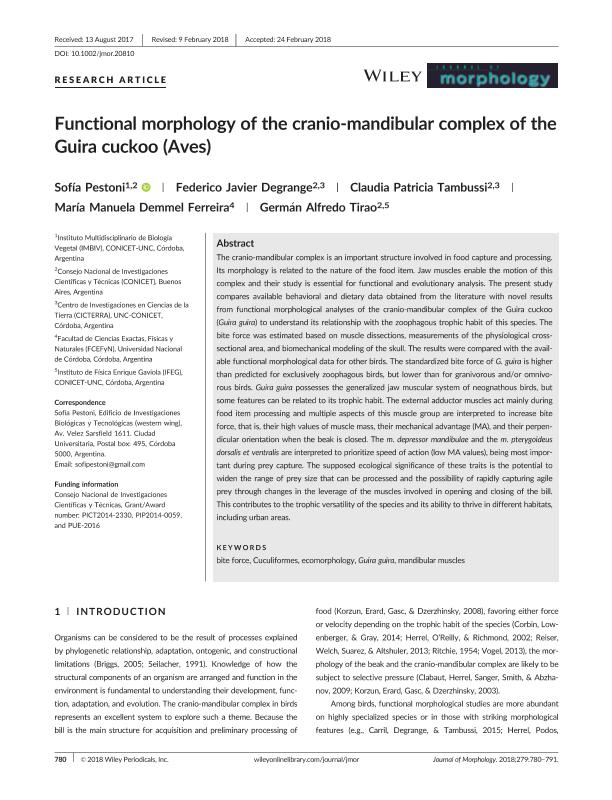Mostrar el registro sencillo del ítem
dc.contributor.author
Pestoni, Sofía

dc.contributor.author
Degrange, Federico Javier

dc.contributor.author
Tambussi, Claudia Patricia

dc.contributor.author
Demmel Ferreira, María Manuela

dc.contributor.author
Tirao, German Alfredo

dc.date.available
2019-11-26T16:24:47Z
dc.date.issued
2018-06
dc.identifier.citation
Pestoni, Sofía; Degrange, Federico Javier; Tambussi, Claudia Patricia; Demmel Ferreira, María Manuela; Tirao, German Alfredo; Functional morphology of the cranio-mandibular complex of the Guira cuckoo (Aves); Wiley-liss, Div John Wiley & Sons Inc; Journal of Morphology; 279; 6; 6-2018; 780-791
dc.identifier.issn
0362-2525
dc.identifier.uri
http://hdl.handle.net/11336/90490
dc.description.abstract
The cranio‐mandibular complex is an important structure involved in food capture and processing. Its morphology is related to the nature of the food item. Jaw muscles enable the motion of this complex and their study is essential for functional and evolutionary analysis. The present study compares available behavioral and dietary data obtained from the literature with novel results from functional morphological analyses of the cranio‐mandibular complex of the Guira cuckoo (Guira guira) to understand its relationship with the zoophagous trophic habit of this species. The bite force was estimated based on muscle dissections, measurements of the physiological cross‐sectional area, and biomechanical modeling of the skull. The results were compared with the available functional morphological data for other birds. The standardized bite force of G. guira is higher than predicted for exclusively zoophagous birds, but lower than for granivorous and/or omnivorous birds. Guira guira possesses the generalized jaw muscular system of neognathous birds, but some features can be related to its trophic habit. The external adductor muscles act mainly during food item processing and multiple aspects of this muscle group are interpreted to increase bite force, that is, their high values of muscle mass, their mechanical advantage (MA), and their perpendicular orientation when the beak is closed. The m. depressor mandibulae and the m. pterygoideus dorsalis et ventralis are interpreted to prioritize speed of action (low MA values), being most important during prey capture. The supposed ecological significance of these traits is the potential to widen the range of prey size that can be processed and the possibility of rapidly capturing agile prey through changes in the leverage of the muscles involved in opening and closing of the bill. This contributes to the trophic versatility of the species and its ability to thrive in different habitats, including urban areas.
dc.format
application/pdf
dc.language.iso
eng
dc.publisher
Wiley-liss, Div John Wiley & Sons Inc

dc.rights
info:eu-repo/semantics/openAccess
dc.rights
Atribución-NoComercial-CompartirIgual 2.5 Argentina (CC BY-NC-SA 2.5 AR)
dc.rights.uri
https://creativecommons.org/licenses/by-nc-sa/2.5/ar/
dc.subject
BITE FORCE
dc.subject
CUCULIFORMES
dc.subject
ECOMORPHOLOGY
dc.subject
GUIRA GUIRA
dc.subject
MANDIBULAR MUSCLES
dc.subject.classification
Zoología, Ornitología, Entomología, Etología

dc.subject.classification
Ciencias Biológicas

dc.subject.classification
CIENCIAS NATURALES Y EXACTAS

dc.title
Functional morphology of the cranio-mandibular complex of the Guira cuckoo (Aves)
dc.type
info:eu-repo/semantics/article
dc.type
info:ar-repo/semantics/artículo
dc.type
info:eu-repo/semantics/publishedVersion
dc.date.updated
2019-10-22T16:39:06Z
dc.identifier.eissn
1097-4687
dc.journal.volume
279
dc.journal.number
6
dc.journal.pagination
780-791
dc.journal.pais
Estados Unidos

dc.journal.ciudad
New York
dc.description.fil
Fil: Pestoni, Sofía. Consejo Nacional de Investigaciones Científicas y Técnicas. Centro Científico Tecnológico Conicet - Córdoba. Instituto Multidisciplinario de Biología Vegetal. Universidad Nacional de Córdoba. Facultad de Ciencias Exactas Físicas y Naturales. Instituto Multidisciplinario de Biología Vegetal; Argentina
dc.description.fil
Fil: Degrange, Federico Javier. Consejo Nacional de Investigaciones Científicas y Técnicas. Centro Científico Tecnológico Conicet - Córdoba. Centro de Investigaciones en Ciencias de la Tierra. Universidad Nacional de Córdoba. Facultad de Ciencias Exactas Físicas y Naturales. Centro de Investigaciones en Ciencias de la Tierra; Argentina
dc.description.fil
Fil: Tambussi, Claudia Patricia. Consejo Nacional de Investigaciones Científicas y Técnicas. Centro Científico Tecnológico Conicet - Córdoba. Centro de Investigaciones en Ciencias de la Tierra. Universidad Nacional de Córdoba. Facultad de Ciencias Exactas Físicas y Naturales. Centro de Investigaciones en Ciencias de la Tierra; Argentina
dc.description.fil
Fil: Demmel Ferreira, María Manuela. Consejo Nacional de Investigaciones Científicas y Técnicas. Centro Científico Tecnológico Conicet - Córdoba. Centro de Investigaciones en Ciencias de la Tierra. Universidad Nacional de Córdoba. Facultad de Ciencias Exactas Físicas y Naturales. Centro de Investigaciones en Ciencias de la Tierra; Argentina
dc.description.fil
Fil: Tirao, German Alfredo. Consejo Nacional de Investigaciones Científicas y Técnicas. Centro Científico Tecnológico Conicet - Córdoba. Instituto de Física Enrique Gaviola. Universidad Nacional de Córdoba. Instituto de Física Enrique Gaviola; Argentina
dc.journal.title
Journal of Morphology

dc.relation.alternativeid
info:eu-repo/semantics/altIdentifier/url/https://www.ncbi.nlm.nih.gov/pubmed/29533471
dc.relation.alternativeid
info:eu-repo/semantics/altIdentifier/doi/http://dx.doi.org/10.1002/jmor.20810
Archivos asociados
